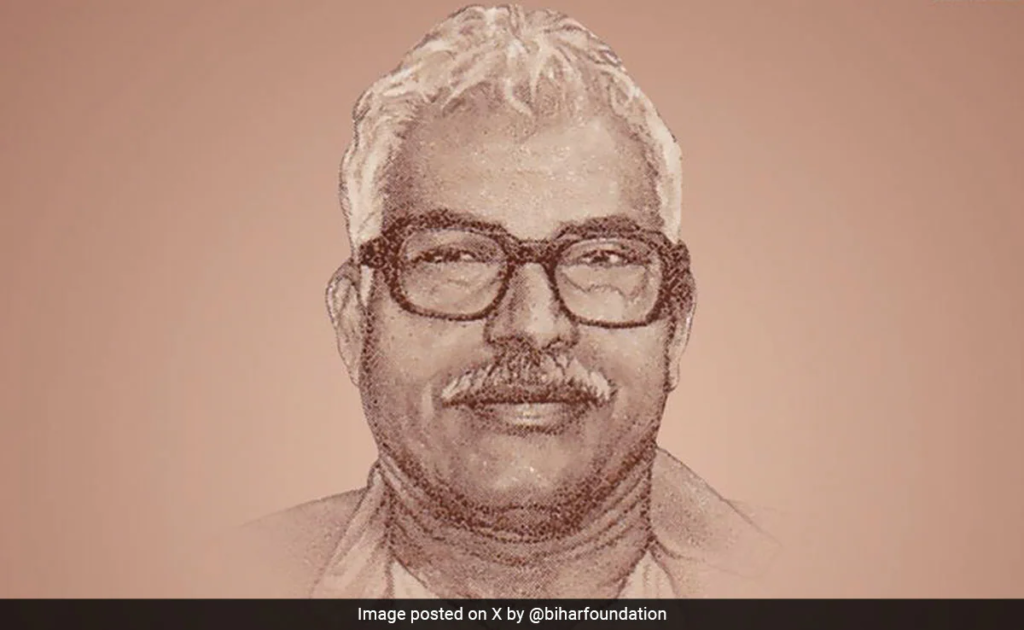Karpoori Thakur’s Biography:
Born to Gokul Thakur and Ramdulari Devi in Pitaunjhia (now Karpuri Gram) village in Samastipur District of Bihar on March 24, 1924, Karpoori Thakur emerged as a huge figure in Indian politics, leaving an important mark on Bihar’s socio-political landscape.
| Born | 24 January 1924 Pitaunjhia, Bihar and Orissa Province, British India |
|---|---|
| Died | 17 February 1988 (aged 64) Patna, Bihar, India |
| Political party | Socialist Party, Bharatiya Kranti Dal, Janata Party, Lok Dal |
| Occupation | Freedom Fighter, Teacher, Politician |
| Awards | Bharat Ratna (2024) |
A member of the Nai (barber) community, Thakur’s journey was shaped by influences like Mahatma Gandhi and Satyanarayan Sinha, compelling him to join the All India Students Federation and actively participate in the Quit India Movement during his university years.

Thakur’s commitment to India’s independence led to a 26-month incarceration, a proof to his unwavering dedication to the cause. Post-independence, he transitioned to the role of a teacher in his village’s school before venturing into electoral politics. In 1952, Karpoori became a member of the Bihar Vidhan Sabha from the Tajpur constituency as a candidate of the Socialist Party.
A defining moment in Karpoori Thakur’s political career happened in 1960 when he was arrested for leading P & T employees during a general strike. This event showcased his advocacy for workers’ rights and his willingness to stand up against perceived injustices.

Thakur’s foray into activism extended beyond workers’ rights. In 1970, Karpoori undertook a 28-day fast unto death to champion the cause of Telco laborers, showcasing his unwavering commitment to social justice.
As the Education Minister of Bihar, Karpoori Thakur advocated for Hindi language and made a significant policy shift by removing English as a compulsory subject for matriculation. This move, however, sparked criticism as it allegedly led to a decline in the standards of English-medium education in the state.
Thakur’s tenure as Chief Minister of Bihar, first in 1970 and later in 1977 after the Janata Party’s triumph in the state, was marked by transformative policies. Karpoori enforced total prohibition of alcohol, established numerous schools and colleges, and initiated the Mungeri Lal Commission report’s recommendations for reservations for Backward Castes in government jobs.
The reservation policy became a focal point of internal strife within the Janata Party, ultimately leading to Thakur’s resignation in 1979. Despite his socialist ideology, Karpoori Thakur faced opposition from upper-caste members within the party who sought to dilute the reservation policy. The subsequent weakening of the reservation law allowed upper castes to secure a larger share of government jobs.
Thakur’s political journey also intersected with the tumultuous period of the Emergency (1975–77), during which he, along with other Janata Party leaders, led the “Total Revolution” movement aimed at non-violent societal transformation.
Karpoori enduring impact on Bihar’s political landscape is evident in the support he garnered from various sections of society, especially the subaltern classes. Thakur’s advocacy for the backward castes, Dalits, and upper OBCs during the Janata Party government in the 1970s left an enduring legacy.
Posthumously, Karpoori Thakur continues to be celebrated through various commemorative measures, including the renaming of his birthplace to Karpuri Gram, the establishment of the Jan Nayak Karpuri Thakur Vidhi Mahavidyalaya (Law College) in Buxar, the opening of the Jannayak Karpoori Thakur Medical College in Madhepura, and the issuance of a commemorative stamp by the Department of Posts.
His memory is further honored through the Jan Nayak Express Train, stadiums named after him across the state, the Karpuri Thakur Museum, and Jan Nayak Karpuri Thakur hospitals in Samastipur and Darbhanga. These tributes highlights the enduring impact of Karpoori Thakur’s advocacy for social justice and his vision for a more inclusive and equitable society.
